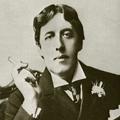The Happy Prince, Part III When day broke, he flew down to the river and he had a bath. “What a remarkable phenomenon,” said the professor of ornithology as he was passing over the bridge. “A swallow in winter!” And he wrote a long letter about it to the local newspaper. Everyone quoted it, it was full of so many words that they could not understand.
“Tonight I go to Egypt,” said the swallow, and he was in high spirits at the prospect. He visited all the public monuments and sat a long time on top of the church steeple. Wherever he went the sparrows chirruped and said to each other, “What a distinguished stranger!” so he enjoyed himself very much.
When the moon rose, he flew back to the Happy Prince. “Have you any commissions for Egypt?” he cried; “I am just starting.” “Swallow, Swallow, little Swallow,” said the Prince, “will you not stay with me one night longer?” “I am waited for in Egypt,” answered the swallow. “Tomorrow my friends will fly up to the Second Cataract. The river-horse couches there among the bulrushes, and on a great granite throne sits the god Memnon. All night he watches the stars, and when the morning star shines, he utters one cry of joy, and then he is silent. At noon the yellow lions come down to the water's edge to drink. They have eyes like green beryls and their roar is louder than the roar of the cataract.” “Swallow, Swallow, little Swallow,” said the Prince, “far away across the city I see a young man in a garret. He is leaning over a desk covered with papers, and in a tumbler by his side there is a bunch of withered violets. His hair is brown and crisp, and his lips are red as a pomegranate, and he has large and dreamy eyes. He is trying to finish a play for the director of the theatre, but he is too cold to write any more. There is no fire in the grate, and hunger has made him faint.” “I will wait with you one night longer,” said the swallow, who really had a good heart. “Shall I take him another ruby?” “Alas! I have no ruby now,” said the Prince; “my eyes are all that I have left. They are made of rare sapphires, which were brought out of India a thousand years ago. Pluck out one of them and take it to him. He will sell it to the jeweler, and buy food and firewood, and finish his play.” “Dear Prince,” said the swallow, “I cannot do that”; and he began to weep. “Swallow, Swallow, little Swallow,” said the Prince, “do as I command you.” So the swallow plucked out the Prince's eye and flew away to the student's garret. It was easy enough to get in, as there was a hole in the roof. Through this he darted, and came into the room. The young man had his head buried in his hands, so he did not hear the flutter of the bird's wings, and when he looked up, he found the beautiful sapphire lying on the withered violets. “I am beginning to be appreciated,” he cried; “this is from some great admirer. Now I can finish my play,” and he looked quite happy.
The next day the swallow flew down to the harbour. He sat on the mast of a large vessel and watched the sailors hauling big chests out of the hold with ropes. “Heave ahoy!” they shouted as each chest came up. “I am going to Egypt!” cried the swallow, but nobody minded, and when the moon rose, he flew back to the Happy Prince.
“I am come to bid you goodbye,” he cried.
“Swallow, Swallow, little Swallow,” said the Prince, “will you not stay with me one night longer?” “It is winter,” answered the swallow, “and the chill snow will soon be here. In Egypt the sun is warm on the green palm trees, and the crocodiles lie in the mud and look lazily about them. My companions are building a nest in the Temple of Baalbec, and the pink and white doves are watching them and cooing to each other. Dear Prince, I must leave you, but I will never forget you, and next spring I will bring you back two beautiful jewels in place of those you have given away. The ruby shall be redder than a red rose, and the sapphire shall be as blue as the great sea.”

